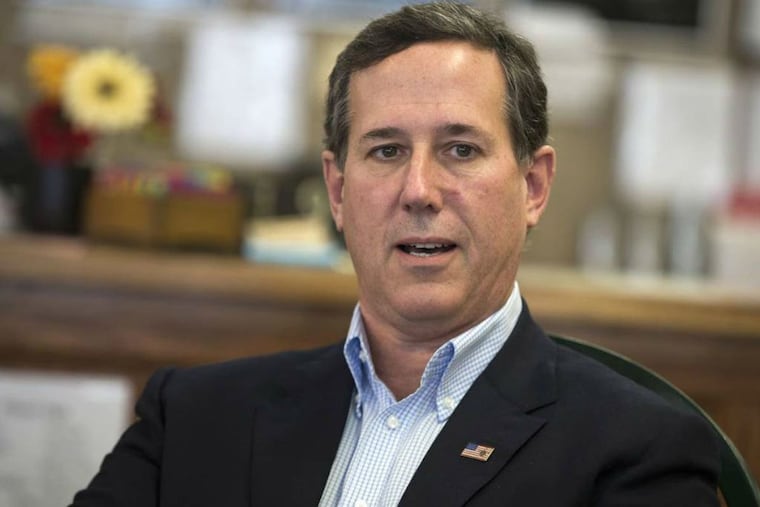For Rick Santorum, a haircut, a health bill and a return to the national fray
Despite having no formal office, the polarizing former Sen. Rick Santorum is in the middle of the latest GOP push to roll back the Affordable Care Act. With a critical deadline looming, he'll be back on Capitol Hill Monday to testify about the plan, continuing to play a role in the national debate more than a decade after losing his Senate seat.

WASHINGTON — More than 10 years and two presidential campaigns after leaving the Senate, Rick Santorum is back in the fray.
Despite holding no political office, the polarizing Pennsylvania Republican has been in the middle of the latest Republican push to roll back the Affordable Care Act, an effort that faces a critical deadline this week in what reads like a horror movie for Democrats, starring an idea and a politician that keep coming back.
Santorum helped craft the latest in a string of Republican proposals, and while it faces internal opposition from key senators and long odds against success, he was back on Capitol Hill on Monday to testify about the plan, playing a role in the national debate more than a decade after losing his Senate seat.
Santorum sat across from some of his former colleagues — as well as the Democrat who beat him, Bob Casey — at a hearing before the Senate Finance Committee as Republicans troed one more desperate push to pass their health care overhaul ahead of a Sept. 30 deadline. A Senate vote could come as soon as Wednesday.
(Santorum was one of four Pennsylvanians taking on prominent roles at the hearing, along with Casey and Republican Sen. Pat Toomey, both committee members, and Teresa Miller, the acting head of the commonwealth's Department of Human Services).
The hugely personal stakes showed. Hundreds of people lined up outside a meeting room that could hold only a few dozen members of the public. Nearly all those inside — many in wheelchairs or with disabilities — erupted into chants of "No cuts to Medicaid! Save our liberty!" They were carried and wheeled out by Capitol police, eventually leaving only four members of the public in the room for much of the hearing.
Santorum said protesters raised the same kind of arguments as those who opposed his push to change welfare 21 years ago.
"This is not the first time that I've had an experience with this type of reaction to a change in an entitlement program," he told the committee. "The reality is that we are doing the same thing in this bill as we did in 1996."
Santorum's route back into the national debate, long after that moment, began in the Senate barber shop, where he found himself one day next to Sen. Lindsey Graham, the South Carolina Republican leading the latest Republican effort on health care.
"I said, 'Lindsey, let me bounce this idea off you,'" Santorum told the Allentown Morning Call. "And he loved it."
Santorum pitched a health plan similar to that of welfare reform. The idea helped create Graham-Cassidy, the bill named for Graham and Sen. Bill Cassidy of Louisiana. For the immediate future it represents Republicans' last chance to fulfill their promise of killing Obamacare. After Sept. 30, special rules that allow them to pass a proposal with 50 votes will expire, leaving them far short of the votes needed to succeed.
Santorum's plan involves turning the money spent on the ACA, or Obamacare, into block grants to states. The idea, Republicans argue, is to let states, rather than the federal government, decide how to spend the money in ways that best suit them.
In pushing the plan Santorum has been a regular back in the Capitol, attending key meetings and news conferences, jumping in to answer questions alongside sitting senators.
Democrats and major medical organizations representing everyone from doctors to hospitals to patients to insurers, have slammed the proposal, warning that it could decrease coverage, raise costs, and eliminate key Obamacare protections, including rules ensuring that people with pre-existing conditions such as cancer or diabetes don't face sky-high prices.
Only 20 percent of the public approves of the latest GOP health bill, while 52 percent disapprove, according to a CBS News poll released Monday.
The "real flexibility" in the bill, said Sen. Ron Wyden of Oregon, the top Democrat on the finance committee, "is the option for states to do worse."
States like Pennsylvania and New Jersey, among those that expanded Medicaid under the law to help millions obtain insurance, could be hammered, according to independent analyses. Pennsylvania would lose $12 billion in federal aid by 2026 and New Jersey would lose $6.4 billion, according to an analysis by the Kaiser Family Foundation.
Miller, Pennsylvania's head of human services, said the Affordable Care Act helped the state bring its uninsured rate from more than 10 percent to an all-time low of 5.6 percent. If the GOP plan passes, she said, governors would face "impossible decisions."
"Who should receive health care?" she said. "A child born with a disability? A young adult struggling with an opioid addiction? A mom fighting breast cancer? A senior who has worked hard all his life and needs access to quality health care to age with dignity?"
The Brookings Institution estimated that 21 million fewer people would have insurance nationwide.
Casey said Republicans are "obsessed" with rolling back Medicaid.
"What is the big problem with 11 million people getting health care?" he asked at the hearing. "Why is that a problem?"